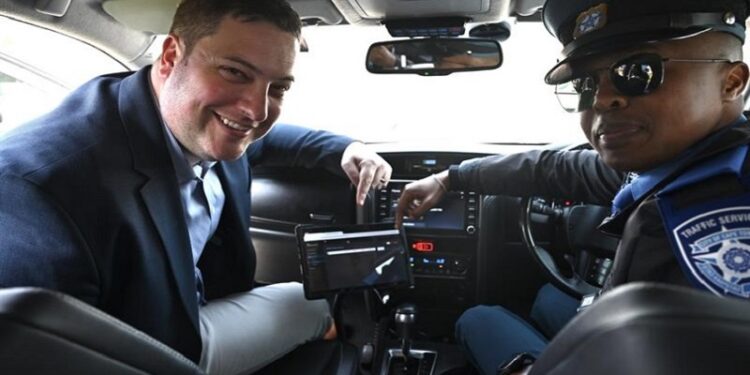Motorists trying to bribe traffic officers in Cape Town had better think again as the city has started equipping its law enforcement officers with body cameras that record all interactions.
The rollout, which includes in-vehicle cameras with automated number plate recognition (ANPR) technology, is the first of its kind in South Africa and forms part of Cape Town’s R860m safety technology investment over the next three years to make the city safer.
The city will equip 800 officers, including traffic police, with bodycams and install 290 in-vehicle dashboard-mounted cameras, or dashcams, this financial year.
“Today [Wednesday] we take the next big step forward in our promised investment in new safety technology to make Cape Town safer,” said mayor Geordin Hill-Lewis, who trialled the new body and in-vehicle camera tech during a demonstration in Goodwood.
“In the next few years this technology will be standard in our safety services to make Cape Town safer. The dashcams are equipped with automated number plate recognition technology so officers will be alerted to wanted vehicles and outstanding warrants instantly in their vehicles. These devices are used widely around the world and have shown tremendous success.”
Hill-Lewis said the game-changing ability of the ANPR dashcams piloted in the new highway patrol unit launched last year had already been seen.
“Based on these learnings, we’re rolling out cutting edge in-vehicle cameras. With body-worn cameras, this will enhance situational awareness and the quality of evidence gathering to ensure convictions.”
He said it also increases trust and accountability in the municipal police and law enforcement, as interactions with the public will be recorded. “This is important. We want Cape Town’s safety services to be trusted by the public, even while trust in other law enforcement agencies is declining.
“There is also global evidence which shows a steep drop in attacks on law enforcement officers after the introduction of the cameras.
“We’re impressed with the successes of the automated number plate recognition pilot in identifying stolen vehicles, those involved in criminal activities and motorists with outstanding warrants.
“The full rollout of an in-vehicle camera solution will enable officers to record evidence of incidents as they happen while also streaming live video to control rooms for enhanced situational awareness of critical incidents.”
He said digital evidence is vital for the prosecution of offenders and body cameras on officers will provide footage that can be used in court, ensuring a higher rate of convictions.
“Bodycams will also enhance officer safety by increasing situational awareness and serving as a deterrent to potential perpetrators of assault on officers. The cameras will also act as a safeguard for the public and city staff, particularly in situations where claims are made against officers, helping to maintain transparency and accountability thanks to independent footage that can be viewed in court,” Hill-Lewis said.
The national transport department has experimented with bodycams in the national traffic police as a tool to deal with high levels of bribery, but plans to roll them out nationally have been put on hold.
“We are constrained financially, so we haven’t decided yet on whether it will be rolled out nationally,” said Road Traffic Management Corporation spokesperson Simon Zwane.
“Even that national rollout will depend on whether provincial traffic departments and municipalities have the resources to procure them. It is on hold for now and there is also not sufficient information on how successful bodycams have been.”
Source: Times Live






 WhatsApp us
WhatsApp us 

